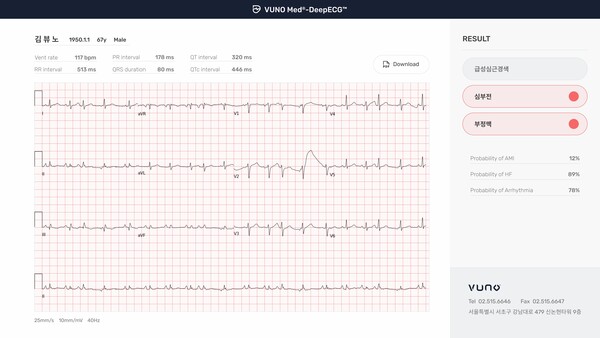VUNO, a medical artificial intelligence (AI) company, announced Wednesday that it will present results of its AI-based ECG analysis software at the American Heart Association 2023 (AHA 2023), which will be held from Saturday this week to Monday next week in Philadelphia, PA, the U.S.

At AHA 2023, VUNO will unveil DeepECG-AMI and DeepECG-LVSD, detailed models of VUNO Med-DeepECG, and also will present four papers on its performance studies.
DeepECG-AMI and DeepECG-LVSD are deep-learning models that use AI to analyze ECG data to detect acute myocardial infarction (AMI) and heart failure.
First, VUNO's research team will present the results of a study of DeepECG-AMI, a deep-learning model that detects AMI. Early diagnosis and detection of AMI is crucial for survival, as it is known to require revascularization within two hours of onset.
In this study, the DeepECG-AMI model analyzed standard 12-lead ECG data to detect patients with acute myocardial infarction with high accuracy. This means that when applied in clinical practice, the model can be useful for healthcare providers to identify patients with AMI who need timely treatment. It is also expected to contribute to faster treatment and improve patient outcomes.
In another study of the DeepECG-LVSD model, detecting left ventricular systolic dysfunction (LVSD), a major type of heart failure, VUNO also demonstrated high accuracy and clinical validity.
LVSD is defined as a condition in which the left ventricular ejection fraction, the rate at which blood is ejected from the left ventricle with each contraction of the heart, falls below 40 percent. This study is significant because it confirms that AI-based ECG analysis can detect the condition with superior performance in addition to echocardiography, which is currently used to diagnose LVSD.
In addition, the team will present the results of interpretability verification to explain the diagnostic principle of the deep ECG-AMI model. The team also analyzed electrocardiogram data of patients with Atrial Fibrillation (AF) using AI to distinguish between early AF and intermediate or advanced AF. This helps to identify patients with early-stage AF who are more likely to be treated and have a better prognosis.
The AHA is the world's leading cardiology organization. It supports research into cardiovascular disease, the number one cause of death worldwide, and hosts an annual meeting that attracts more than 30,000 researchers each year to share the latest advances.
"At AHA 2023, where our four research papers were accepted, we will unveil a blueprint for future business, using our AI-based ECG analysis software," said VUNO CEO Lee Ye-ha. "ECG data is a clue to various diseases such as atrial fibrillation, hyperkalemia, and chronic kidney disease, as well as acute myocardial infarction and heart failure, so we will continue to apply AI technology for the patient's healthcare."
Related articles
- FDA OKs VUNO's brain imaging analysis device
- 'VUNO Med-DeepCARS outperforms traditional methods in cardiac arrest prediction'
- VUNO’s cardiac arrest-predicting device now available for children under 19
- VUNO’s Q3 sales surge with success of AI-based cardiac arrest management system
- VUNO, Readycure sign MOU to develop AI-based dementia treatment medical devices
- VUNO exports AI medical imaging solution to military hospitals in Uzbekistan
- VUNO's AI chest CT reading solution wins reimbursement in Japan
- ‘Verquvo is a safe option for patients with worsening heart failure’

